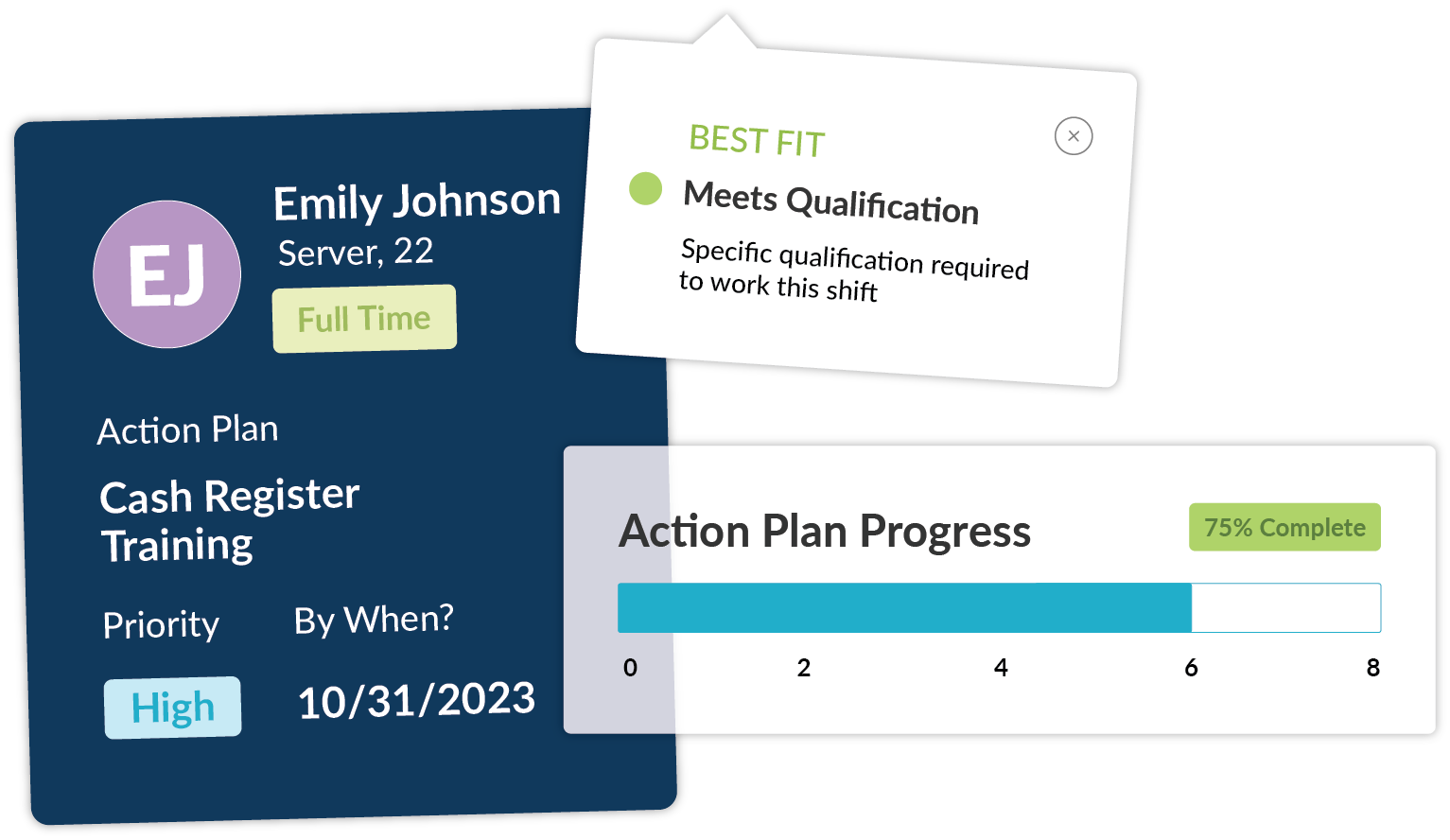Product
Scheduling
Time & Attendance
Forecasting
HR
Shift Management
Task Management
Performance Management
Employee Engagement
Skills Management Software
Develop skills for
higher productivity.
Record, identify, and analyze skills across your workforce. Get an overview of staff strengths and weaknesses and optimize labor accordingly.
8,134 + reviews
higher productivity.
Record, identify, and analyze skills across your workforce. Get an overview of staff strengths and weaknesses and optimize labor accordingly.
8,134 + reviews
Trusted by over 10,000 businesses





Record employee skills and competencies.
-
Create skills required for every team and score employees based on competency. Designate desired skill levels to paint a picture of where employees are untrained, competent, or experienced in critical aspects of their job. Building a skills library like this gives your organization the foundation it needs to begin optimizing how work gets done.
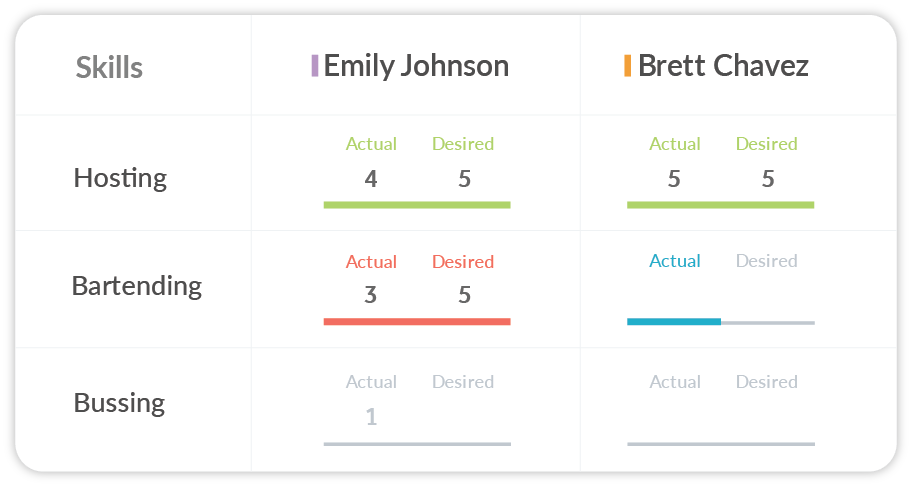
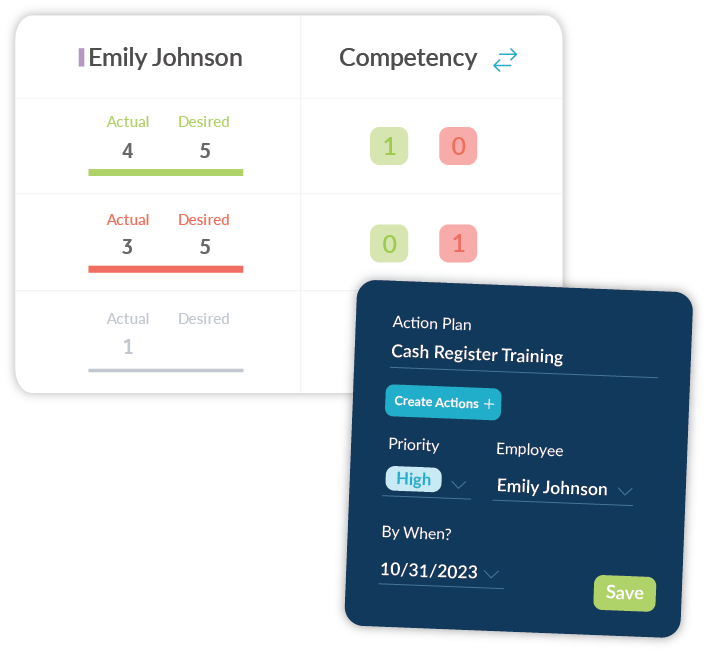
Identify gaps and opportunities with a skills matrix
-
Break down strengths and weaknesses with a skills matrix for every employee. Quickly determine opportunities for training or outside recruitment to fulfill your labor needs. Bridging these gaps improves customer service and drives workplace efficiency.
Analyze development with a skills reporting dashboard.
-
Get a 30,000-foot view of your talent pool with reports on skill competency and assessment completion. Easily visualize at a large scale where your workforce excels, where they fall short, and where more training, hiring, or assessment is needed.
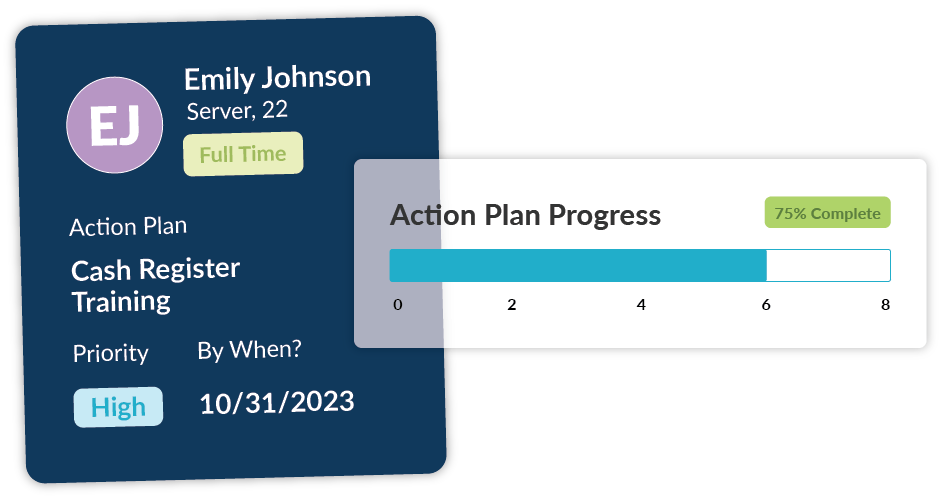
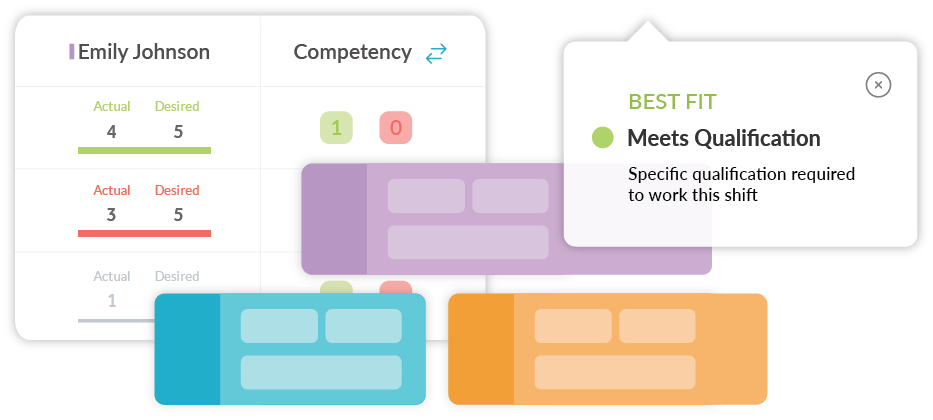
Schedule staff better with skills management.
-
Use your skills matrix data to schedule best-fit staff for shifts that require that little somethin’ extra. Workforce.com makes it easy to build schedules optimized for skill competency as well as qualifications, wage cost savings, and more.
“The decision to go with Workforce.com was an easy one - You can really tailor it to your business.”
- Bryan Buccino, CEO, LIVunLtd
“Workforce.com gives us the capability to cross-schedule team members to fill in skill gaps across different teams and locations.”
- Nicole Grube, HR Manager, Amenity Collective
Still have questions? Want to learn more? Schedule a time with one of our product specialists.
Frequently Asked Questions
How much does Workforce.com's skills management system cost?
To find out what will work best for your business, request a quote via our pricing page.
What makes skills gap analysis an important part of talent management?
Talent management isn’t just about hiring and onboarding efficiently; it’s about taking stock of the talent you have to determine the talent you still need. Otherwise, you’ll be hiring blindly. Skills gap analysis and competency frameworks help you achieve this by identifying key areas where employees lack the skills needed to fulfill your labor needs. Effective talent management initiatives should seek to upskill and reskill employees before any moves are made to hire new talent.
Why is skills tracking important for career development?
Tracking skill set competency is essential for development plans in the long run. Without an accurate record of their strengths and weaknesses, management won’t know what key areas to focus on for training. Use skills tracking to clearly lay out where opportunities lie for job advancement.
Are skills assessments useful for performance management?
Identifying where employees excel and fall short on job skills is a major part of how human resources manages performance. During a performance review, it helps to bring up an employee’s skill matrix to help them understand the exact areas where they need to improve in their job role.
Does Workforce.com also track employee certifications?
Yes! You can add any type of license or certification to an employee’s profile in Workforce.com. Additionally, you can require certification to work specific shifts to ensure maximum labor compliance. The system automates who can be scheduled to work based on their certification status.
How is a skills management platform used in healthcare?
Mapping skill competency is particularly important in the healthcare industry. Facilities can track competency in things like patient interaction, medication management, infection prevention, and more.
Can I improve retention by tracking skills data?
Understanding an employee’s current skills and helping them further develop their competency boosts their job confidence, engages them in their role, and make them feel valued by management. So yes, if used effectively, adopting a cloud-based skills management system can go a long way in improving your retention rates.
All my staffing data is stored in a separate HR platform. Does Workforce.com have integration capabilities?
Yes, Workforce.com integrates with a wide range of HRIS, payroll, and HCM systems. You can bulk import your staff directly into Workforce.com, including data like job descriptions, employee IDs, pay rates, start dates, leave balances, certifications, and more.
How can I test out this software?
You can sign up for a free trial to explore it on your own, or, go ahead and book a demo with one of our specialists to get an in-depth overview covering the system’s full potential.
How much training is needed to use Workforce.com's skill competency management software?
Hardly any! Workforce.com prides itself on being incredibly user-friendly, especially for frontline employees and managers. Skills matrices are easy to fill out and find in the system, and the reporting is incredibly intuitive for admins. Moreover, real-time mobile notifications make it easy to stay engaged and informed about how skills are developing across your organization.

